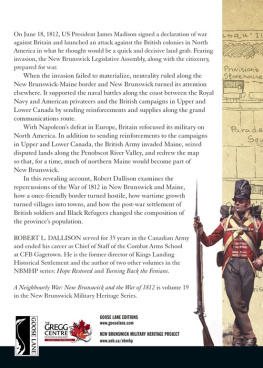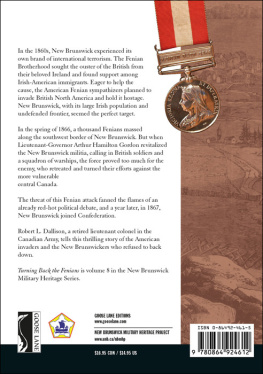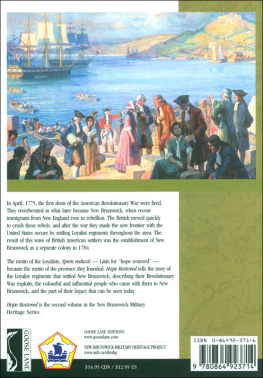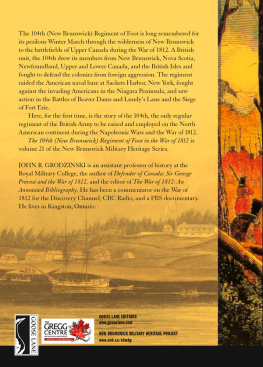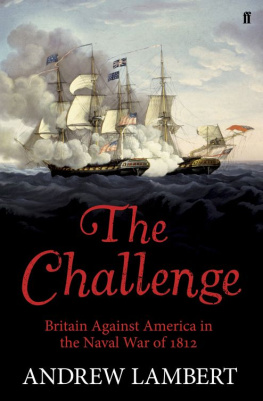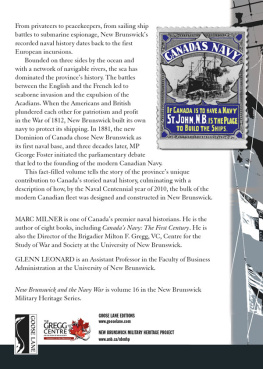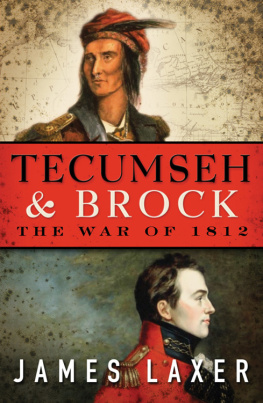Copyright 2012 by Robert L. Dallison.
All rights reserved. No part of this work may be reproduced or used in any form or by any means, electronic or mechanical, including photocopying, recording, or any retrieval system, without the prior written permission of the publisher or a licence from the Canadian Copyright Licensing Agency (Access Copyright). To contact Access Copyright, visit www.accesscopyright.ca or call 1-800-893-5777.
Edited by Brent Wilson and Barry Norris.
Front cover illustration courtesy of Parks Canada H.04.44.02.03.20F and New Brunswick Museum 33485-2.
Back cover illustration by Don Troiani.
Map detail on front and back covers courtesy of Ernest A. Clarke.
Cover design by Julie Scriver and Chris Tompkins.
Page design by Chris Tompkins.
Library and Archives Canada Cataloguing in Publication
Dallison, Robert L., 1935-
A neighbourly war [electronic resource]: New Brunswick and the War of 1812 / Robert L. Dallison.
(New Brunswick military heritage series; 19)
Co-published by: Gregg Centre for the Study of War & Society. Includes bibliographical references and index. Electronic monograph. Also issued in print format. ISBN 978-0-86492-742-2
1. Canada History War of 1812. 2. New Brunswick History, Military 19th century. 3. New Brunswick History 1784-1867. I. Gregg Centre for the Study of War and Society II. Title. III. Series: New Brunswick military heritage series (Online); 19
FC442.D36 2012 971.034 C2011-907828-7
Goose Lane Editions acknowledges the financial support of the Canada Council for the Arts, the government of Canada through the Canada Book Fund (CBF), and the government of New Brunswick through the Department of Wellness, Culture and Sport.
Goose Lane Editions 500 Beaverbrook Court, Suite 330 Fredericton, New Brunswick CANADA E3B 5X4 www.gooselane.com | New Brunswick Military Heritage Project The Brigadier Milton F. Gregg, VC Centre for the Study of War and Society University of New Brunswick PO Box 4400 Fredericton, New Brunswick Canada E3B 5A3 www.unb.ca/nbmhp |
Introduction
For two decades, Britain and France had been locked in a life-and-death struggle. Through 1811 and into 1812, hostilities in Europe expanded into a global conflict, forcing Britain to the breaking point. In this environment of global warfare, it became increasingly difficult for the United States to protect its trade links and maintain its rights as a neutral on the high seas. In its view, the Royal Navy posed the greatest challenge to freedom of the seas and routinely insulted its flag. To add to their frustration, Americans firmly believed that the British were continuously thwarting their ambition to expand their frontier westward. With all of Britains resources focused on the desperate struggle with Napoleon, the timing would never be more propitious for the United States to confront its traditional antagonist. On June 18, 1812, President James Madison declared war on Britain.
The threat of war with the United States had existed for years, but when it finally came it was met by Britons with a sense of disbelief and dismay. Could Americans not understand that the real threat was Napoleons unquenchable thirst for world domination? Could they not see that the Royal Navy had kept the tyrant from American shores? With war a sudden reality, the people of New Brunswick, fearing for their lives, families, and property, felt extremely vulnerable; the provinces extensive border with the United States made invasion a distinct possibility. The response by the provincial legislative assembly and the general public was both patriotic and immediate. Despite the lack of military resources, every possible measure was taken to put New Brunswick in the best possible state of defence. Plans were made, militia training intensified, and fortifications built.
Strategists in Washington seriously considered invading across the Maine border with the goal of capturing the vital naval base at Halifax. Fortunately for Britains Atlantic colonies, the Madison administration found it impossible to wage total war. The New England states did not support what they considered to be Mr. Madisons War, going so far as to threaten separation if Washington tried to coerce them into any kind of military operation. Lieutenant-General Sir John Coape Sherbrooke, the governor of Nova Scotia and commander-in-chief in the Atlantic region, took full advantage of New Englands reluctance to become involved in the conflict by offering to abstain from offensive operations and issuing licences to those willing to continue normal peacetime trade across the border. New Brunswick was quick to follow this initiative, and in short order an extensive and mutually beneficial trade blossomed between the enemies. Trade flourished to such an extent that it was facetiously claimed that British soldiers ate American beef while American soldiers slept under British blankets and marched in uniforms made from British cloth.
To the great relief of New Brunswickers, the undeclared state of neutrality along the border held for two years. As the threat of invasion faded, the focus of New Brunswicks war effort turned to supporting the campaigns in Upper and Lower Canada and naval operations along the Atlantic coast, including taking an active role in privateering. With the sudden collapse of Napoleons armies in Europe, the war in North America took a dramatic turn. For Britain, the freeing up of military resources enabled it to adopt a more aggressive stance against the Americans. In New Brunswick, the provincial authorities considered this a golden opportunity to settle the still-disputed boundary with Maine in their favour. At their instigation, British military forces occupied Eastport, Maine, and the Penobscot River valley, and for a short period, the British regarded northern Maine as part of New Brunswick. The Treaty of Ghent, which ended the War of 1812, coincided with the final defeat of Napoleon and peace in Europe. With peace came a substantial reduction of British military forces. Many of the British regiments in North America were disbanded, and their veterans were offered free land grants. These military settlers would be a major legacy of the war for New Brunswick.
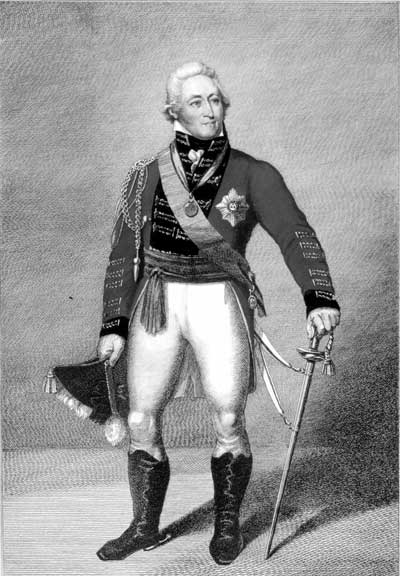
Major-General Sir John Coape Sherbrooke, governor of Nova Scotia and commander-in-chief of British forces in the Lower Provinces from 1811 to 1816. National Gallery of Canada
While New Brunswick was not in the forefront of hostilities, the War of 1812 was a defining event for the fledgling province. New Brunswick and the other British North American colonies rejoiced in Britains military successes, which enhanced their mutual sense of empire. New Brunswicks economy, moreover, had matured during the conflict, which would be remembered as a prosperous period in the provinces history. Finally, what might have become a nasty and bitter experience with its American neighbours led instead to a sense of shared history and a uniquely friendly relationship between New Brunswick and Maine. The War of 1812 was truly a Neighbourly War.
Chapter One
Reacting to the Threat of War
Heavy war clouds hung over the citizens of New Brunswick. During the nearly thirty years since the American Revolutionary War, there had been continuous friction between the United States and Britain. Americans harboured a strong feeling of resentment and hatred for the British, while anti-American sentiment based on a feeling of rejection, commercial jealousy, and a perception that the Americans supported Frances quest for world domination was widespread in Britain. Hostilities came close to breaking out in 1794, 1807, and again in 1808, though in each case last-minute diplomacy managed to maintain an uneasy peace.
Next page
